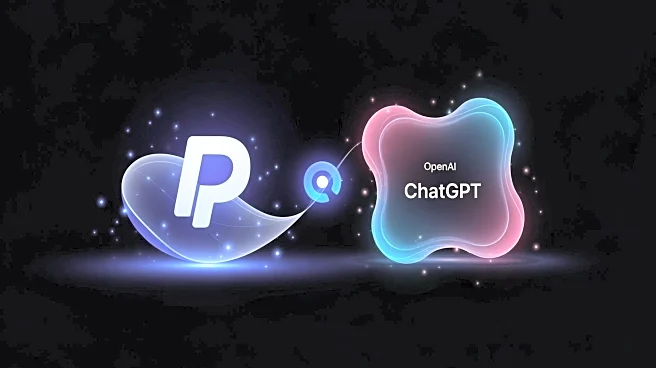What's Happening?
PayPal has entered into a strategic partnership with OpenAI to integrate its digital wallet into ChatGPT, allowing users to make purchases directly through the AI platform. This collaboration aims to leverage
ChatGPT's capabilities to facilitate e-commerce transactions, enabling PayPal users to buy items found via the AI tool. The integration is set to begin next year, with PayPal's ecosystem allowing both users and merchants to engage in transactions through ChatGPT. PayPal CEO Alex Chriss highlighted the potential for a secure checkout experience for its hundreds of millions of wallet holders. This move positions PayPal as a key player in the emerging field of agentic AI shopping, following similar e-commerce partnerships by OpenAI with Shopify, Etsy, and Walmart.
Why It's Important?
The integration of PayPal's digital wallet with ChatGPT marks a significant advancement in the use of artificial intelligence for e-commerce. By embedding payment capabilities into AI platforms, PayPal is poised to become a central component in the future of online shopping, potentially transforming consumer behavior and merchant operations. This development could lead to increased convenience and security for users, as transactions are facilitated by verified merchants and consumers. The partnership also underscores the growing importance of AI in streamlining business processes and enhancing customer experiences, potentially driving innovation and competition in the fintech and e-commerce sectors.
What's Next?
As PayPal prepares to launch its integration with ChatGPT next year, the company will focus on managing merchant routing, payment validation, and other backend processes to ensure seamless transactions. This initiative may prompt other fintech companies to explore similar partnerships with AI platforms, potentially leading to a broader adoption of AI-driven commerce solutions. Stakeholders, including merchants and consumers, are likely to monitor the rollout closely, assessing its impact on transaction efficiency and fraud prevention. The success of this integration could influence future collaborations between AI developers and payment service providers.
Beyond the Headlines
The partnership between PayPal and OpenAI could have deeper implications for the ethical and legal dimensions of AI in commerce. As AI tools become more integrated into everyday transactions, questions around data privacy, consumer protection, and the role of AI in decision-making may arise. Additionally, the shift towards AI-driven shopping experiences could alter traditional retail models, prompting businesses to adapt to new consumer expectations and technological advancements.









